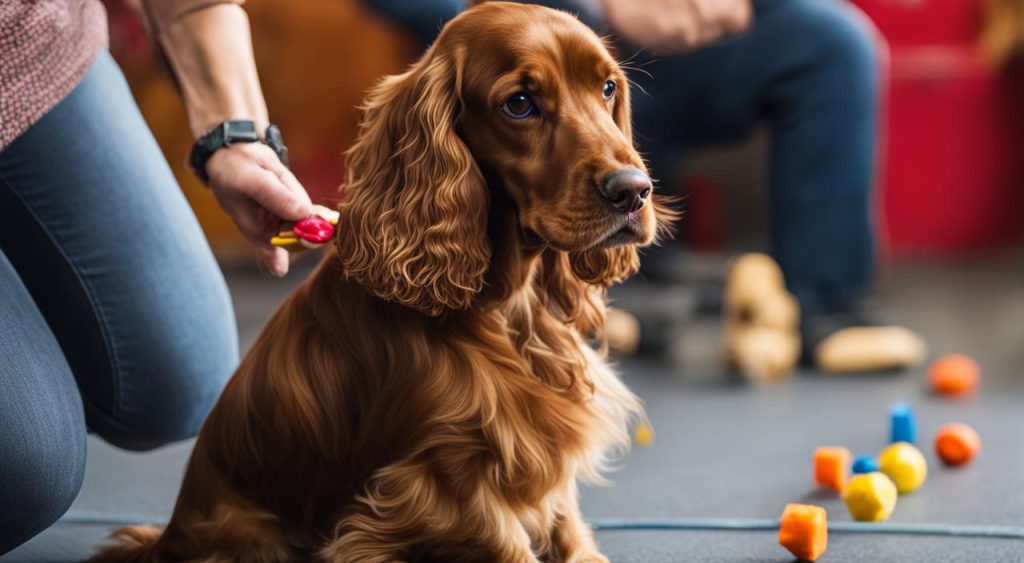When considering bringing a Cocker Spaniel into your home, you may wonder about their trainability. The good news is that Cocker Spaniels are generally easy to train.
Cocker Spaniels are intelligent, eager to please, and quick learners. They respond well to positive reinforcement, making training sessions more enjoyable for both you and your furry friend. However, it’s important to keep in mind their active nature and tendency to get easily distracted.
To ensure successful training, it’s recommended to start early socialization and training in puppyhood. This will help them develop good obedience and behavior as they grow up.
Cocker Spaniels possess a versatile set of skills and excel in various activities such as agility, flyball, and nose work. Their history as bird retrievers on shoots speaks to their natural abilities and eagerness to learn.
Key Takeaways:
- Cocker Spaniels are generally easy to train due to their intelligence and eagerness to please.
- Positive reinforcement is an effective training technique for Cocker Spaniels.
- Training should start in puppyhood to ensure good obedience and behavior.
- Cocker Spaniels have a versatile skill set and excel in activities like agility and flyball.
- They demonstrate qualities such as good self-control and adaptability to new environments, making them trainable companions.
Training Tips for Cocker Spaniels
When it comes to training challenges with Cocker Spaniels, patience and persistence are key. Training a Cocker Spaniel puppy requires time and dedication, but with the right techniques, you can have an obedient and well-behaved companion. Positive reinforcement training is highly effective for these intelligent and eager-to-please dogs.
To start the training process, invest in the necessary equipment such as a treat pouch, soft collar, harness, training leash, non-slip mat, and grooming brush. These tools will assist you in effectively training your Cocker Spaniel.
Consistency is crucial for successful training. Set aside dedicated time each day to work on commands and behaviors. Keep training sessions short and focused to keep your Cocker Spaniel engaged and prevent them from becoming easily distracted.
Positive reinforcement is the key to training a Cocker Spaniel. Reward desired behaviors with treats and praise to encourage their obedience. This method creates a positive association and motivates them to repeat those behaviors.
Training topics that should be covered include teaching your Cocker Spaniel to sit, lie down, respond to their name, come when called, walk nicely on a leash, play fetch, sleep in a crate, cope with being left alone, and go to the bathroom in the right place.
One useful training tool is the “Push Drop Stick” game. This game helps determine when to progress or regress in training difficulty, ensuring continuous improvement. It keeps the puppy engaged and maintains the momentum throughout the training process.
Crate Training for Cocker Spaniels
Crate training is an essential part of training Cocker Spaniels. The crate should be a safe and comfortable space for your dog, not a place of punishment.
To start crate training, choose a crate that is the appropriate size for your Cocker Spaniel. It should be large enough for them to stand up and turn around comfortably. Consider options like plastic, fabric, or metal crates.
Make the crate inviting by placing comfortable bedding inside, along with toys and treats. You can also take the crate door off initially to help your dog feel more at ease.
Feeding your dog meals inside the crate can create positive associations. Start by gradually closing the door after your dog finishes eating, increasing the time with the door closed over time.
Gradually increase the duration your dog spends in the crate, starting with short periods and gradually working up to 30 minutes or more. Crating your dog when you leave home will help them get used to being alone and prevent accidents.
Remember not to use the crate as a form of punishment. Allow your dog to become comfortable with staying in the crate and avoid using it as their only source of confinement.
Conclusion
Training your Cocker Spaniel can be a fulfilling and enjoyable journey that strengthens the bond between you and your furry friend. With patience and consistency, you can help your Cocker Spaniel become a well-behaved and obedient companion.
Fortunately, there are plenty of training resources available to assist Cocker Spaniel owners like yourself. Training guides and classes can provide valuable insights and techniques to help you navigate the training process.
Remember, positive reinforcement is key. Rewarding your Cocker Spaniel for desired behaviors with treats and praise will motivate them to continue learning and following your commands. Keep training sessions short and engaging to maintain their focus and make it a fun experience for both of you.
By investing time and effort into training, you’ll be amazed at how your Cocker Spaniel transforms into a well-behaved, obedient, and loving companion. So, embrace the journey, stay patient, and be consistent in your training approach. You and your Cocker Spaniel are on your way to a lifelong partnership filled with mutual understanding and happiness.





